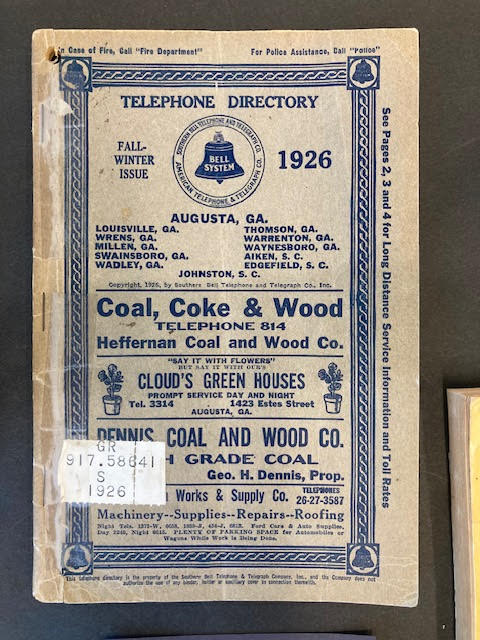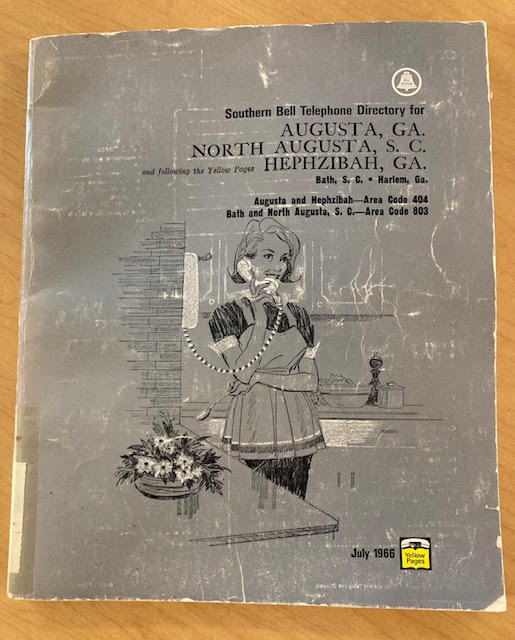The Georgia Room at the Augusta-Richmond County Public Library maintains a collection of telephone books, most focusing on areas of Augusta-Richmond County though some include phone numbers from North Augusta and Aiken.
With the end of the telephone war between National Bell Telephone Company and the Western Union Telegraph company around 1880, Southern Bell Telephone Company emerged as the sole licensee of the American Bell Telephone Company, supplying telephones to Virginia, West Virginia, North Carolina, South Carolina, Georgia, Florida, and Alabama. Not only did they become the leader in providing telephone service to the Augusta area, they became the leading producer of that necessary telephone accessory, the telephone directory.
While it is difficult to say when the first telephone was operational in Augusta, enough units were in use to justify the construction of a telephone exchange in 1879, evidence that Augusta was an early adopter of this exciting new technology. Subscriptions grew steadily and by 1930, Augusta was eagerly awaiting the day when 10,000 telephones would be in use.
The speed of the adoption of telephone service could be tracked by the issuance of the telephone directory. Initially, a directory was printed for telephone subscribers quarterly. Later, the publication occurred bi-annually. By 1930, the book was published annually and had become a fixture of daily life. Southern Bell skipped issuing an annual directory for Augusta in 1934 and the public was irate. It was bad enough to cut the frequency of issues but to not have an up-to-date volume as all? Unthinkable. Southern Bell got the message and went on to issue a yearly directory until 1991 when, under the supervision of the Augusta Chronicle and the Augusta Herald, “The Phone Book” made its appearance.
Of course, there could be some discussion as to how successfully people were using their telephone books. Almost from the inception of the telephone information desk, intended to provide information on telephone numbers which weren’t listed in the telephone directory, the majority of callers asked for numbers that could, with a little study, be found in the current volume. In an attempt to reduce the load on the telephone operators, residents were instructed in 1916 to “Always Look in the Book.” In 1920, users were admonished that operators were there to answer questions about unlisted telephone numbers not to serve as “weather prophets” and experts on “miscellaneous subjects”. In 1949, it was reported that 79% of all calls to information could be answered with a quick peak in the phone book. However, all the pleading seemed to have little effect. A 1979 Ann Landers column published a letter from a harassed telephone operator lamenting that they regularly answered calls that could be answered by consulting the phone directory.
Ah, but what you could do with a telephone directory in by-gone years. In 1920, you could use it to learn the cheapest possible rates for each class of phone call. By 1931, you could flip through the attached business classified directory, the yellow pages, to shop without leaving your home. In 1933, you could win prizes, should you be so lucky to be called, in a promotion for the Modjeska Theater, using the phone directory to answer the questions. In 1950, users could combat “buzzing “or reckless airplane flying by a quick call to the Civil Aeronautics Administration just by looking under US Government. The Augusta Chronicle used the telephone directory in 1960 to conduct a “political survey” on how many listed Kennedys were going to vote for John F. Kennedy (The results were mixed at best.) In 1963, the directory was turned to a more noble purpose. The Girl Scouts used the directory to phone every household listed in Richmond County to publicize a county wide polio vaccine drive. The humble telephone directory even documented social change. In 1977, joint listings showing the names of husband, and wife appear in the phone directory for the first time. A company spokesman remarked, “These days there are more and more women who are known by their own first name rather than their husband’s…the new service will make it easier to find those names in the directory.”
And while examining the history of the local telephone unearths some interesting observations, what is the value of a phone book to the modern genealogical researcher? Telephone directories serve as additional sources for locating the names and addresses of ancestors. An appearance in the telephone directory can hint at the economic condition of the ancestor since it was a listing of individuals who could afford to maintain a telephone number. The same rational applies to businesses. Telephone books can give additional listings of businesses and paint a picture of their relative health. Larger advertisements or listings generally pointed toward a healthier business since a subscriber’s costs increased for larger, more elaborate ads.
So, if you discover an old telephone directory in an attic or basement, consider donating it to the Georgia Room to preserve its information. It will allow everyone to “let your fingers do the walking” through Augusta history.



